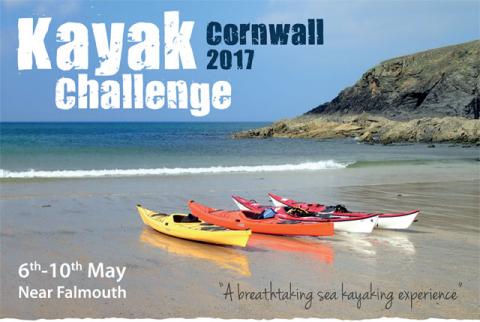See Cornwall from a kayak!
Submitted by amysell on Wed, 11/16/2016 - 16:15


Take a look at the Marine Conservation Society's latest press release:
Fundraising expedition led by expert paddlers will give a sea view of the Cornish coast
The Marine Conservation Society (MCS), the UK’s leading marine charity, is behind a fantastic opportunity to see one of the most spectacular parts of the UK’s coastline from a kayak, as part of an expedition led by seasoned paddlers.
For a fourth year, MCS is organising a kayak challenge to help raise funds for its vital conservation work, and after two events around the Isles of Scilly, the five day paddle-fest returns to Cornwall, where it began in 2014.
Seeing all the Cornish coast has to offer from a 17ft long sea kayak that carves through the water at four knots, crossing bays and rounding headlands to then ‘nose' into caves, gullies and archways will be an experience like no other. With no engine the effect on the environment is minimal so the paddler is ‘at one’ with breathtaking surroundings. This is a trip of stunning scenery, fascinating wildlife, highly experienced guides and all in aid of the UK’s leading marine conservation charity.
Leading the expedition is Nick Arding who has worked with MCS over the last four years. Nick comes with an outdoors pedigree that is hard to match – so all the kayakers will be in safe hands.
Nick Arding OBE spent 23 years as an officer in the Royal Marines and led a Royal Navy expedition to climb the North Ridge of Mount Everest. Nick is a highly experienced rock climber and mountaineer, having climbed and ski toured in many areas across the world during the past 30 years. Nick is a trainer and coach in Remote First Aid and a BCU 5 star leader and Level 2 coach and ISKGA guide.
In 2013, Nick and his wife sea kayaked the length of Britain for MCS, raising almost £4,000 and received the charity’s Fundraiser of the Year award. The following year they ran the first kayak challenge around Cornwall.
This year’s event takes place from Saturday 6th May - Wednesday 10th May 2017 and will start from Port Mylor, near Falmouth. Accommodation is in tents. No previous kayaking experience is necessary – although it might be a good idea to sit in one before you go!
After initial training the group of up to 18, will head to the Carrick Roads estuary by Falmouth, then off towards Rosmullion Head, eastwards past Towan Beach and the austere cliffs of Nare Head. ‘Ralph’s Cupboard’, Samphire Island, ‘Deadman’s Cove’, and Mullion Cove will be visited before hitting the Atlantic swell off the Lizard Peninsula,and round to ‘Lizard Point’.
Paddlers will also get an opportunity to take part in a beach clean and get first hand experience of the shocking rubbish that’s washed up, dropped or blown on to our beaches day in day out.
Paddlers can either pay an initial deposit of £95 and raise a further £600 for MCS or pay £695 in full. Places are allocated on a first-come-first-served basis and with just 18 available you’re encouraged to apply as soon as possible.
To find out more about the expedition visit: www.mcsuk.org/url/kayak
Scilly challengers from previous events have told us -
Robyn Shilland: “The whole week was an incredible experience. The guides were fantastic and adapted to everyone’s ability levels, and continuously helped us, as a group and individually, to improve. The challenge was well organised and perfectly suited to a group of mixed experience.”
Mike Hunter: “It was the most amazing experience, well organised and expertly led by our friendly, supportive and knowledgeable instructors. I learnt a lot about sea kayaking, conservation and also more general stuff about camping and all kinds of things from the other participants.”
Georgina Smith: “We learnt about rescues, which is a useful skill. And when one member of the group got in "the zone" and headed far away from everyone else they showed how they could kayak super fast when required.”
Chris Edgar: “I feel more connected with the marine environment, with a sense that there is a lot of work needed to support and protect these areas.”
